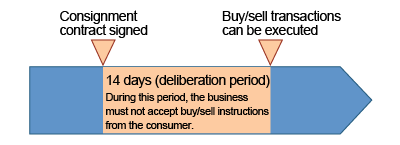Solicitation rules for commodity futures transactions are changing! : When solicited, do not make a contract if you don't understand the structure of transaction or the risk size
Solicitation rules for commodity futures transactions will change with revisions (effective June 2015) to the Ordinance for Enforcement of the Commodity Derivatives Act and other regulations. With certain exceptions, the uninvited solicitation of consumers for commodity futures transactions (i.e. personal visits and phone calls that are made to consumers to solicit contracts even though a consumer has not requested the solicitation) are prohibited. This time the categories of exception have been expanded. Under these new solicitation rules, the uninvited solicitation of consumers who satisfy certain criteria will be permitted more widely than before for Japanese exchange-traded futures transactions.
As a result, consumers with no intention of investing in commodity futures transactions may face a greater chance of being solicited for such contracts.
Commodity futures transactions are transactions that promise in advance to buy or sell a product at a certain time in the future at a certain price. They are complexly structured, high-risk/high-return transactions that can incur losses above the amount invested (i.e. investors may not only lose the amount they originally invested, but also be required to pay additional money). If solicited by a business, consumers should decline the solicitation or contract if they are not interested in trading, do not understand the structure of the transaction, or do not understand the size of the risk.
Summary of new solicitation rules1
(1) Criteria under which uninvited solicitation is permitted
Under the new solicitation rules, the uninvited solicitation of consumers by a business is permitted when a consumer is already engaged in high-risk transactions (e.g. FX transactions, security transactions on margin, etc.). Additionally, following certain procedures and rules, they can solicit consumers who meet all three of the following criteria.
Criteria:
[1]Is under 65 years old
[2]Does not live off a pension, etc. (income from a pension, etc. does not exceed income from other sources)
[3]Satisfies either criteria A or B below2
A Has an annual income of eight million yen or more
B Has financial assets of 20 million yen or more
In the above cases, prior to any solicitation (sales pitch) the business must first verbally confirm that the targeted consumer satisfies all three of the above criteria, as well as confirm that the consumer is willing to be solicited (to listen to the sales pitch). A business may not solicit persons who do not satisfy the criteria or are unwilling to be solicited.
Moreover, the following two safeguards ((2) and (3) below) also apply in the case of contracts made with persons not currently engaged in high-risk transactions.
(2) Safeguards prior to signing
Even when a consumer satisfies the criteria for uninvited solicitation, the business is required to give the consumer a test prior to signing to confirm that the consumer understands the risks of the transaction (e.g. that their losses may exceed their margin, etc.).
A business may only sign a contract when the consumer has answered all questions on the test correctly (has confirmed an adequate understanding of the transaction's risks).
(3) Safeguards after signing
Even after signing, there are the following safeguards in place.
- No transactions may be executed within 14 days (the "cooling off period" (see Diagram.)) of signing the contract.
- The maximum allowable investment can be no more than one-third of the combined total of the consumer's annual income and financial assets. Also, when the required margin deposit reaches the maximum allowable amount, it is mandatory that the transaction be ended.
- Except for experienced consumers,3 transactions during the first 90 days may not exceed one-third of the maximum allowable investment.
- The business must warn the consumer in advance of the possibility of additional losses.
Diagram: "Deliberation period"

The deliberation period means 14 days from the time of entering into a consignment contract to the time when buy/sell transactions can be started. During this period, the business must not accept buy/sell instructions from the consumer.
- 1 See METI website "Revisions made to solicitation rules for commodity futures transactions" (Japanese only)
(http://www.meti.go.jp/press/2014/01/20150123001/20150123001.html). - 2 In addition to A and B under criteria 3, the uninvited solicitation of consumers by a business is also permitted, following certain procedures and rules, if the consumer possesses certain credentials (attorney, judicial scrivener, certified public accountant, tax accountant, financial planner, securities sales representative (class 1) or securities analyst).
- 3 Refers to persons with more than 90 days total experience with commodity derivatives transactions (excluding loss limited transactions) in the three immediately preceding years.
Advice for Consumers
- Decline solicitations and contracts if you are not interested in trading or do not understand the structure of the transaction or the size of the risk.
- Do not buy into sales pitches promising that you will "get rich" and "can't lose money."
- Verify whether the business is licensed.
- Answer questions about annual income, etc. accurately.
- Even after you have signed the service agreement, think carefully about your actual transactions.
- Keep a record of your communications with the business.
- In case of trouble, consult your local consumer center or other such agency.
